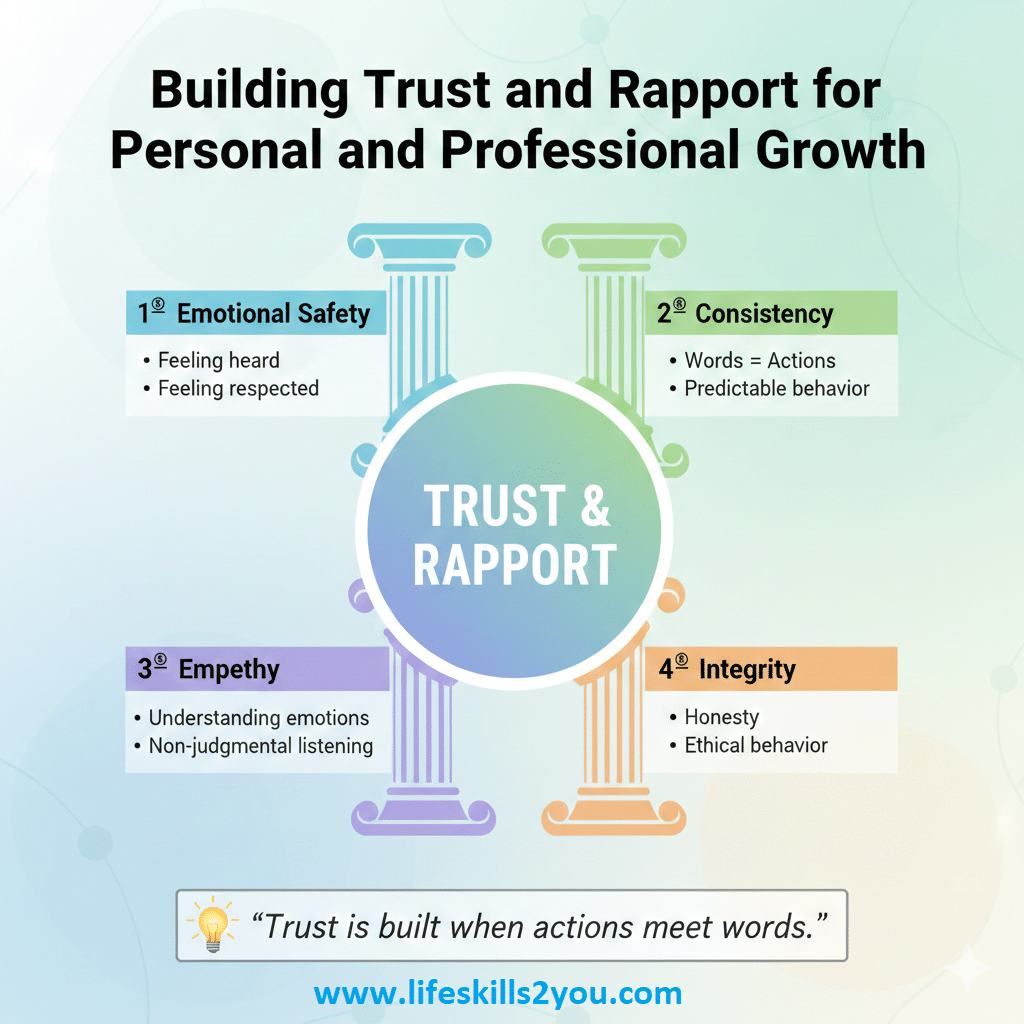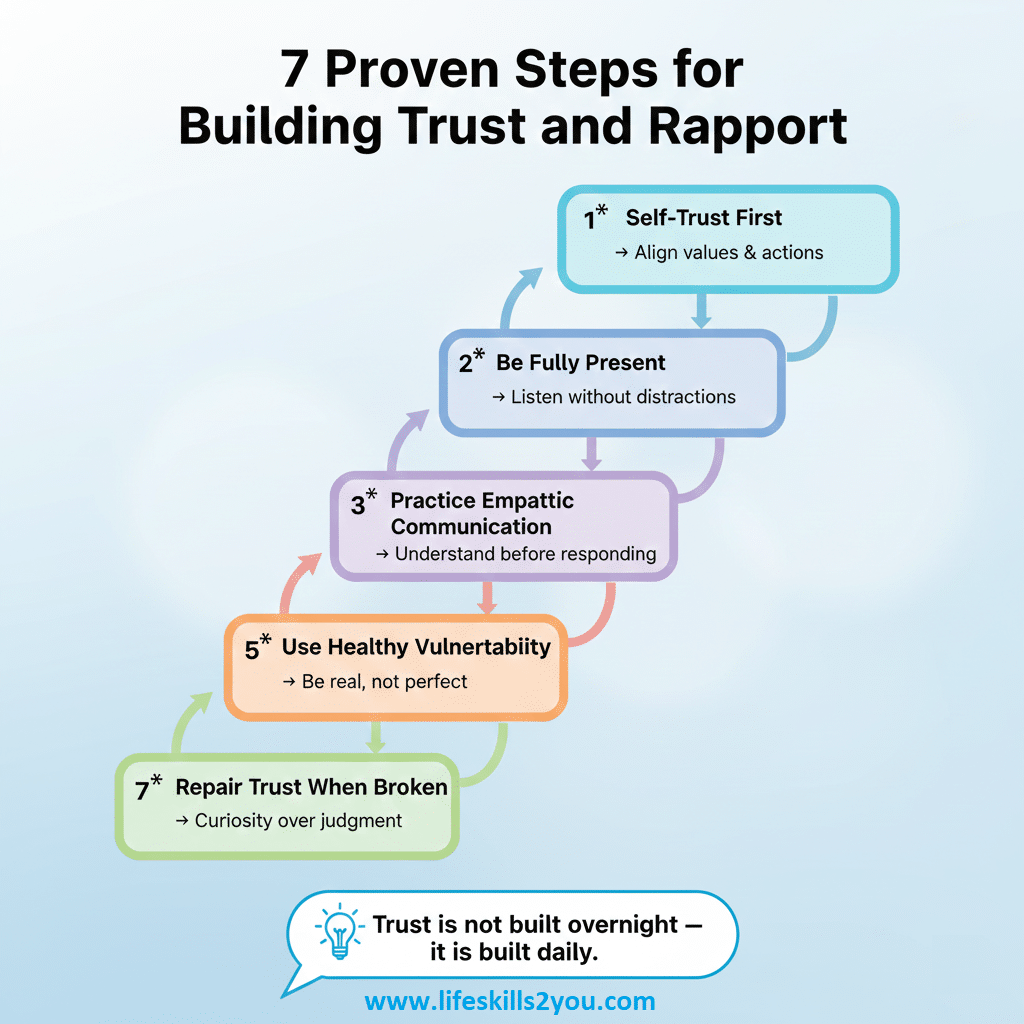Table of Contents
Introduction
Trust is invisible—but its absence is loud.
Have you ever worked with someone highly skilled, yet something felt “off”? Or met a person briefly and instantly felt safe, understood, and open around them? That invisible force shaping those experiences is trust—and its close companion, rapport.
In my two decades as a life skills trainer and personality development coach, I’ve seen careers stall not due to lack of talent, but due to lack of trust. I’ve also seen ordinary professionals rise rapidly because people believed in them. The difference was never IQ or credentials—it was their ability in Building Trust and Rapport for Personal and Professional Growth.
In today’s hyper-connected yet emotionally distant world, trust has become a rare currency. Remote work, digital communication, fast-paced lives, and rising stress have made genuine human connection both more difficult—and more valuable—than ever before.
Whether you are:
- a leader managing teams
- a professional navigating workplace politics
- an entrepreneur building client relationships
- or an individual seeking deeper personal bonds
Your growth depends on one skill more than any other: your ability to build trust and rapport consistently and authentically.
Psychology confirms this. Harvard research shows that high-trust workplaces experience 50% higher productivity, 76% more engagement, and significantly lower burnout. In personal relationships, trust is the strongest predictor of long-term satisfaction, according to relationship science.
This article is not theory-heavy fluff.
It is a practical, psychology-backed, experience-driven roadmap to mastering Building Trust and Rapport for Personal and Professional Growth—step by step, story by story, skill by skill.

Let’s begin.
What Does Trust and Rapport Really Mean?
Trust vs Rapport – Understanding the Difference
Although often used interchangeably, trust and rapport are not the same.
| Aspect | Trust | Rapport |
|---|---|---|
| Nature | Long-term belief | Immediate connection |
| Built Through | Consistency & integrity | Empathy & similarity |
| Time | Develops over time | Can form quickly |
| Outcome | Reliability | Comfort & openness |
- Rapport is the door opener
- Trust is the relationship sustainer
True mastery lies in Building Trust and Rapport for Personal and Professional Growth together—not separately.
The Psychology Behind Trust Formation
Trust is not emotional guesswork. It is neurological.
According to social neuroscience:
- Trust activates oxytocin, the bonding hormone
- Rapport reduces amygdala threat response
- Consistency strengthens prefrontal cortex prediction
This means people trust you when:
- You feel emotionally safe
- You behave predictably
- You align words with actions
“People don’t trust words. They trust patterns.”
Why Building Trust and Rapport Is Non-Negotiable Today
In Professional Growth
In coaching corporate teams, I often ask:
“Who here trusts their manager enough to speak openly?”
Only 30–40% raise their hands.
Lack of trust leads to:
- Silent disengagement
- Fear-driven compliance
- Innovation shutdown
Whereas Building Trust and Rapport for Personal and Professional Growth leads to:
- Psychological safety
- Ownership mindset
- Faster collaboration
Google’s Project Aristotle confirmed psychological safety as the #1 factor behind high-performing teams.
In Personal Growth
Trust impacts:
- Relationship depth
- Emotional regulation
- Self-worth
Clients struggling with boundaries often don’t lack confidence—they lack trust literacy.
When you trust yourself and others:
- You communicate clearly
- You attract healthier relationships
- You grow emotionally secure
The 7-Step Framework for Building Trust and Rapport

Step 1 – Self-Trust Comes First
You cannot build trust externally if you don’t trust yourself internally.
Self-trust means:
- Keeping promises to yourself
- Acting in alignment with values
- Managing emotions responsibly
🔍 Coaching Insight:
A senior manager once told me, “People don’t listen to me.” After reflection, we discovered he didn’t listen to himself—he ignored boundaries and overcommitted. Once self-trust improved, external trust followed.
Self-awareness, Emotional Intelligence, Authentic Leadership
Step 2 – Presence Over Performance
Rapport is built when people feel felt.
Be fully present:
- Maintain natural eye contact
- Avoid multitasking
- Listen without planning replies
According to Harvard Business Review, leaders who practice active listening are rated as more trustworthy and competent.
“Attention is the rarest and purest form of generosity.”
Step 3 – Master Empathic Communication
Empathy is not agreement. It is understanding.
Use:
- “I understand how that feels”
- “That makes sense given the situation”
Avoid:
- Immediate advice
- Dismissive positivity
This strengthens Building Trust and Rapport for Personal and Professional Growth faster than any technique.
Empathic Listening, Non-verbal Communication
Related : The Ultimate Guide to Communication Skills, The Ultimate Guide to Emotional Entelligence
Step 4 – Consistency Builds Credibility
Trust grows when actions match words—repeatedly.
In organizations I’ve trained:
- Managers who followed through built loyalty
- Those who didn’t lost respect permanently
Consistency includes:
- Timelines
- Tone
- Emotional reactions
People forgive mistakes—but not unpredictability.
Step 5 – Vulnerability with Boundaries
Contrary to myths, vulnerability strengthens trust.
Share:
- Lessons learned
- Honest limitations
- Real challenges
Avoid:
- Oversharing trauma
- Emotional dumping
Brené Brown’s research shows vulnerability is the birthplace of trust and connection.
Step 6 – Respect Differences Without Judgment
Trust collapses when people feel judged.
Practice:
- Curiosity over correction
- Inclusion over ego
- Dialogue over debate
This is essential in multicultural teams and relationships.
Inclusive Communication, Psychological Safety
Step 7 – Repair Trust When Broken
Trust will break—it’s human.
What matters is repair.
Effective repair includes:
- Ownership without excuses
- Timely apology
- Changed behavior
According to relationship psychology, repaired trust becomes stronger than untouched trust.
Real-Life Examples of Trust in Action
Example 1: Corporate Leadership Transformation
A mid-level leader reduced team attrition by 40% in 6 months by practicing transparency and listening circles.
Example 2: Coaching Client – Relationship Repair
A client rebuilt a strained marriage by shifting from defensiveness to empathy.
Example 3: Sales Professional
Trust-based selling increased repeat clients without aggressive pitching.
Example 4: Entrepreneur
Building trust online through value-driven content created loyal audiences.
Common Mistakes That Destroy Trust
- Overpromising
- Inconsistency
- Emotional manipulation
- Fake empathy
Avoid these to protect Building Trust and Rapport for Personal and Professional Growth.
Research & Credible References
- Harvard Business Review on trust at work
👉 Workplace Trust Research - Brené Brown – vulnerability and leadership
👉 Vulnerability and Trust
Conclusion
Trust is not a soft skill—it is a life skill.
In every role you play—leader, partner, parent, professional—your growth accelerates when trust is strong and rapport is real.
Building Trust and Rapport for Personal and Professional Growth is not about manipulation or charm. It is about integrity, empathy, consistency, and courage.
Build it daily. Protect it fiercely. Repair it humbly.
Your relationships—and your future—depend on it.
Thank you for exploring this insightful article.
If you’re hungry for more knowledge, don’t miss out on our other engaging articles waiting for you. Dive into our treasure trove of wisdom and discover new perspectives on related topics.
Click ‘Our Blog’ and ‘How to Guide’ to embark on your next adventure.
Happy reading!
FAQs: Building Trust and Rapport for Personal and Professional Growth
1. Why is trust important for growth?
Trust enables collaboration, openness, and emotional safety—essential for learning and performance.
2. Can rapport be built quickly?
Yes, through empathy, mirroring, and presence—but trust needs time and consistency.
3. How long does trust take to build?
It varies, but consistent behavior over weeks creates credibility.
4. Can trust be rebuilt after betrayal?
Yes, with accountability, transparency, and changed actions.
5. Is trust more important than skills?
Often yes—skills open doors, trust keeps them open.
6. How does body language affect rapport?
Open posture, eye contact, and tone strongly influence trust perception.
7. Can introverts build rapport effectively?
Absolutely—authentic listening often builds deeper trust.
8. What role does honesty play?
Honesty builds credibility, even when messages are uncomfortable.
9. How do leaders create trust fast?
By listening, following through, and modeling vulnerability.
10. Is trust measurable?
Yes—through engagement, retention, and feedback patterns.

